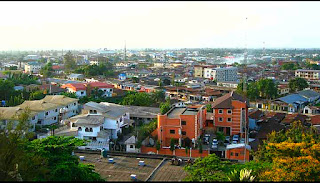Abakiliki: Developing? All you need to know
introduction
The Abakiliki local government is a town located in the southeastern part of Nigeria - Ebony state.
It is one of the fastest-growing cities in Nigeria. The town is home to many industries and businesses, as well as a large population of about 631,000 people, The people are also very friendly and welcoming Igbos.
Electricity
The people here in Abakiliki mainly depend on electricity to power their homes, businesses, and industries. The power supply situation in the Abakiliki local government is no different from the rest of Nigeria because Nigeria has an electricity problem that has been going on since I was born. The country's electricity generation capacity is never enough to meet its demand, and there are constant blackouts in Abakiliki just like anywhere in Nigeria.
Security
The security situation in Abakiliki is not good and has been a major concern for people in the area. There have been multiple cases of armed robbery, kidnapping, killings, and other criminal activities in the past few months. The police do not seem to be doing much to curb the situation. This has led to an increase in the number of people living in fear and anxiety.
The recent case of armed robbery has become a major concern in Abakiliki. The perpetrators have been targeting banks and other places where they can get quick money, such as fuel stations and supermarkets. The police don't seem to understand what's going on and have not been able to stop these incidents from occurring.
Road and drainage system
Abakiliki has very muddy roads and we have been experiencing some issues with the muddy roads and drainage system.
To address these issues, the local government has been working on several projects to improve the condition of the roads and drainage system in the area. They are also looking for ways to reduce pollution by providing more public transportation options for residents.
weather and population density and noise
The weather is hot and humid and there are very few trees to provide shelter from the noise in the area. The population of Abakiliki Local Government Area is about 631,000 predominantly Igbo people.
access to water
Access to water in Abakiliki local government is not easy. They are faced with the challenge of water scarcity and distribution.
The water scarcity problem is a result of climate change, population growth, and issues with the infrastructure. The population growth has led to increased demand for water which has put pressure on the supply. The infrastructure problems have made it difficult to get access to clean drinking water because they are not well-maintained and lack proper storage facilities.
cost of living
The cost of living in Abakiliki is not as high as the average in Ebony state. The average monthly expenditure for a family of four is about N25,000. This means that it is cheaper to live in Abakiliki than in other townships in Ebony State.
jobs
Just like most parts of Nigeria, there are few job opportunities in Abakaliki, The major economic activities in the town are agriculture, fishing, and small-scale manufacturing.
Some of the jobs available in Abakiliki are:
- Government Jobs
- Teaching Jobs
- Health service jobs - Banking Jobs
- some industrial jobs
Education
The literacy rate in Abakaliki is about 75% and rising. This means that out of every 100 people in the local government area, only 75 are literate and 25 are illiterate. The literacy rate for males is higher than that for females at 64% and 36% respectively.
healthcare
Healthcare in Abakiliki is better when compared to most parts of Nigeria, many public clinics and hospitals provide medical care to patients from all over Ebony state such as:
- The Ebony state ministry of health
- The General Hospital,
- The Ebony state university teaching hospital,
- The Abakiliki general hospital,
- And many others.
conclusion
Abakiliki is a really beautiful place to live in although The living condition in Abakaliki's local government isn't the best due to the many challenges facing the people living there, such as unemployment and poor infrastructure.













Comments
Post a Comment